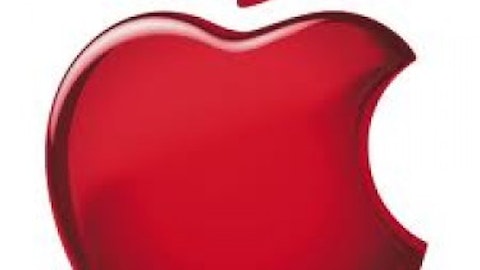This week investors witnessed an important moment in financial history: Apple Inc. (NASDAQ:AAPL) announced the largest corporate bond offerings in history issuing $17 billion in debt.
But investors would be best served to skip this new issue. Here are four reasons to avoid Apple’s ‘iBonds’.
Rising interest rates
With yields at record lows, a slight increase in interest rates could result in massive losses for investors.

Lots of things could cause rates to rise suddenly.
An improving global economy could encourage investors to rotate out of bonds and into equities. This would also prompt the Federal Reserve to cut its bond buying program.
Many fear inflation could hit double-digits due to the Fed’s easy monetary policy. While I dismiss the tin foil hat alarmist, investors should note that just a slight uptick in inflation from 1.5% to 3% would wipe out investor returns.
Little risk premium
Apple Inc. (NASDAQ:AAPL) is a incredibly good borrower.
The company generates $60 billion in EBITDA and is backed by $145 billion in cash. Even if the company’s profits were cut in half the business can easily sustain the $55 billion in debt the company is expected to issue over the next three years.
Clearly the market agrees. Apple can borrow at rates nearly as low as the U.S. government. Some are puzzled why Standard and Poor’s didn’t award the company the coveted AAA credit rating.
Because technology is a risky business. Already, competition is starting to squeeze Apple Inc. (NASDAQ:AAPL)’s profitability.
Microsoft Corporation (NASDAQ:MSFT) is starting to gain traction in the mobile space. Last week, Strategy Analytics reported Windows captured 7.4% of tablet sales during the first quarter, shipping 3 million units. Windows is also gaining ground in the smartphone segment, accounting for 5.6% of sales in Q1, up 1.9 points year-over-year.
Google Inc (NASDAQ:GOOG)’s Android continues to gain ground against Apple Inc. (NASDAQ:AAPL) in the mobile space. Because Google licenses its operating system to hardware manufacturers for free, prices Android handsets significantly undercut the iOS platform. As the market growth for tablet and smartphones transitions to price-conscious late-adopters and emerging-market consumers, Android is best positioned.
Could these rivals upset Apple? That’s a topic for another article. However, history suggests tech titans rise and fall quickly. Just five years ago Nokia Corporation (ADR) (NYSE:NOK) and Research In Motion Ltd (NASDAQ:BBRY) were the leaders in mobile.
Of course, Apple Inc. (NASDAQ:AAPL) isn’t likely to default. But any deterioration in the company’s operations would increase the risk premium on its bond.
0% real return
Let’s be clear: I’m not predicting higher interest rates, gold-bug like hyperinflation, or Apple’s demise.
Interest rates may stay low.
Inflation could remain tame.
Apple Inc. (NASDAQ:AAPL) will probably be just fine.
The problem is investors aren’t being compensated for these risks. When your nominal yield is 2%, there isn’t much room for error. Real returns are zilch after you factor in taxes and inflation.
Given that any of the above variables could suddenly change, ‘safe’ Apple bonds start to look incredibly risky.
Better alternatives
In contrast to expensive bonds, the equity portion of Apple Inc. (NASDAQ:AAPL)’s business is incredibly cheap.
Backing out the cash on the company’s balance sheet, the market is valuing Apple’s entire business at less than seven times earnings while the company generates a 10% annual free cash flow yield.
Need income? Yield starved savers also receive a juicy 3% dividend yield, higher than the rate on the corporate bonds. In addition, equity investors are also better protected against inflation.
Right now the market is pricing Apple as a slow growth tech stock with declining margins. That scenario may very well play out. Or perhaps Apple Inc. (NASDAQ:AAPL) reinvents another industry with the iTV or the iWatch.
Equity investors get to participate in the upside. Bond holders don’t.
The article 4 Reasons to Avoid Apple iBonds originally appeared on Fool.com and is written by Robert Baillieul.
Copyright © 1995 – 2013 The Motley Fool, LLC. All rights reserved. The Motley Fool has a disclosure policy.



